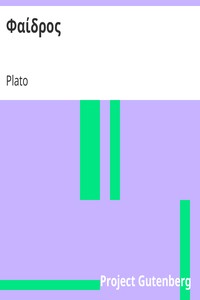Φαίδρος by Plato
"Φαίδρος" by Plato is a dialogue composed around 370 BC. Socrates and Phaedrus meet outside Athens to discuss love, rhetoric, and the nature of the human soul. Through three competing speeches, they explore whether it is better to favor a non-lover or a true lover, while examining how persuasion should be practiced. The conversation ranges from divine inspiration and madness to the famous chariot allegory, revealing deeper questions about reason, desire, and
the art of speech-making. (This is an automatically generated summary.)
Read or download for free
| How to read | Url | Size | |||
|---|---|---|---|---|---|
| Read now! | https://www.gutenberg.org/ebooks/35604.html.images | 377 kB | |||
| EPUB3 (E-readers incl. Send-to-Kindle) | https://www.gutenberg.org/ebooks/35604.epub3.images | 154 kB | |||
| EPUB (older E-readers) | https://www.gutenberg.org/ebooks/35604.epub.images | 157 kB | |||
| Kindle | https://www.gutenberg.org/ebooks/35604.kf8.images | 301 kB | |||
| older Kindles | https://www.gutenberg.org/ebooks/35604.kindle.images | 283 kB | |||
| Plain Text UTF-8 | https://www.gutenberg.org/ebooks/35604.txt.utf-8 | 341 kB | |||
| Download HTML (zip) | https://www.gutenberg.org/cache/epub/35604/pg35604-h.zip | 149 kB | |||
| There may be more files related to this item. | |||||
Similar Books
About this eBook
| Author | Plato, 428? BCE-348? BCE |
|---|---|
| Translator | Gounaris, K. |
| Title | Φαίδρος |
| Alternate Title | Phaedrus |
| Note | Wikipedia page about this book: en.wikipedia.org/wiki/Phaedrus_(dialogue) Wikipedia page about this book: el.wikipedia.org/wiki/%CE%A6%CE%B1%CE%AF%CE%B4%CF%81%CE%BF%CF%82_(%CE%B4%CE%B9%CE%AC%CE%BB%CE%BF%CE%B3%CE%BF%CF%82) |
| Credits | Produced by Sophia Canoni. Book provided by Iason Konstntinides |
| Reading Level | Reading ease score: 83.0 (6th grade). Easy to read. |
| Language | Greek |
| LoC Class | B: Philosophy, Psychology, Religion |
| Subject | Socrates, 470 BC-399 BC |
| Subject | Rhetoric -- Early works to 1800 |
| Subject | Love -- Early works to 1800 |
| Subject | Soul -- Early works to 1800 |
| Subject | Lysias |
| Category | Text |
| EBook-No. | 35604 |
| Release Date | Mar 18, 2011 |
| Most Recently Updated | Jan 7, 2021 |
| Copyright Status | Public domain in the USA. |
| Downloads | 215 downloads in the last 30 days. |
| Project Gutenberg eBooks are always free! | |

